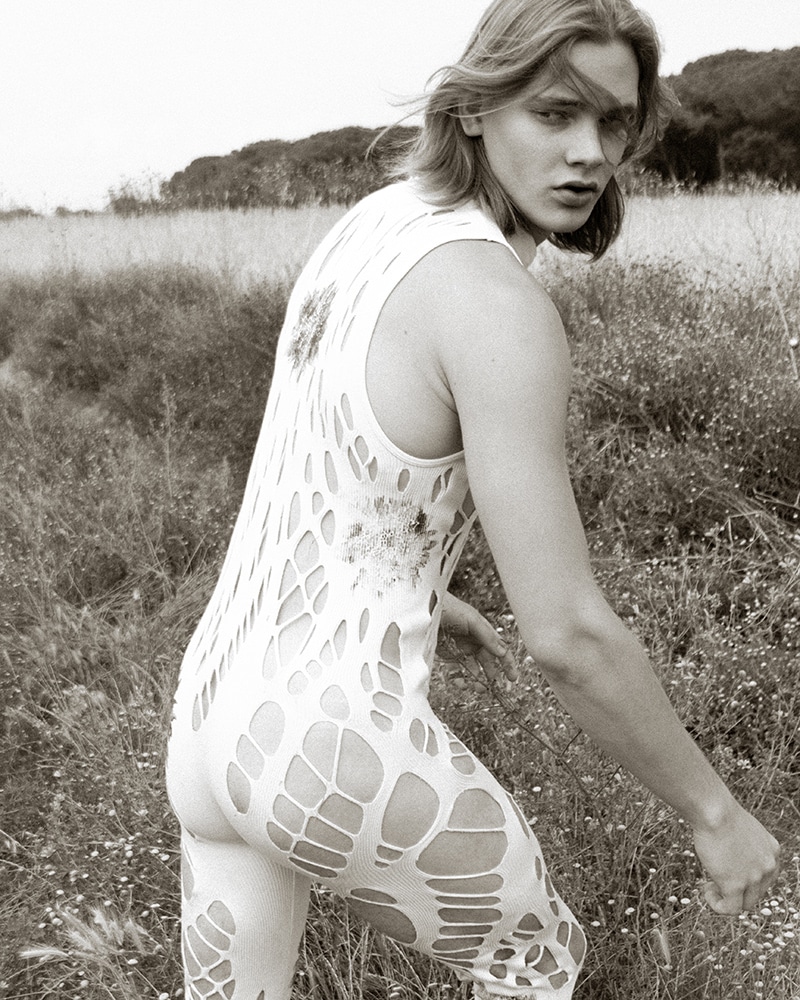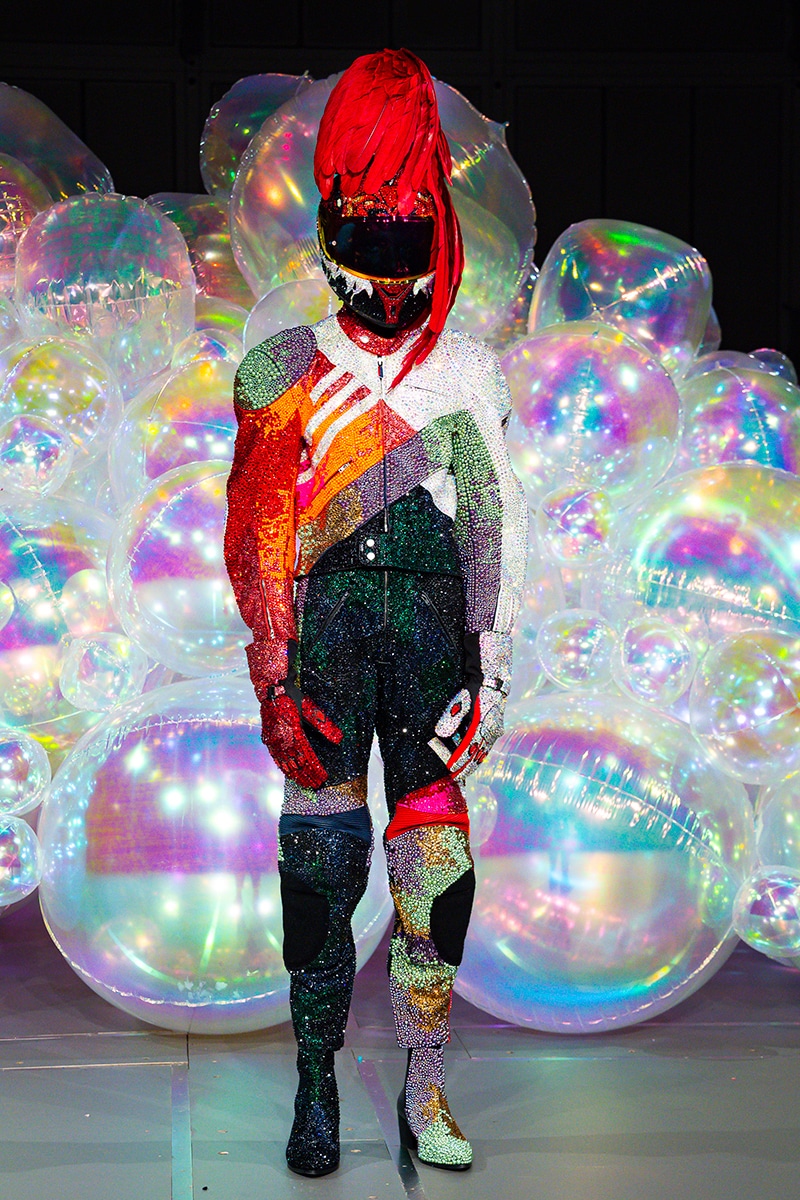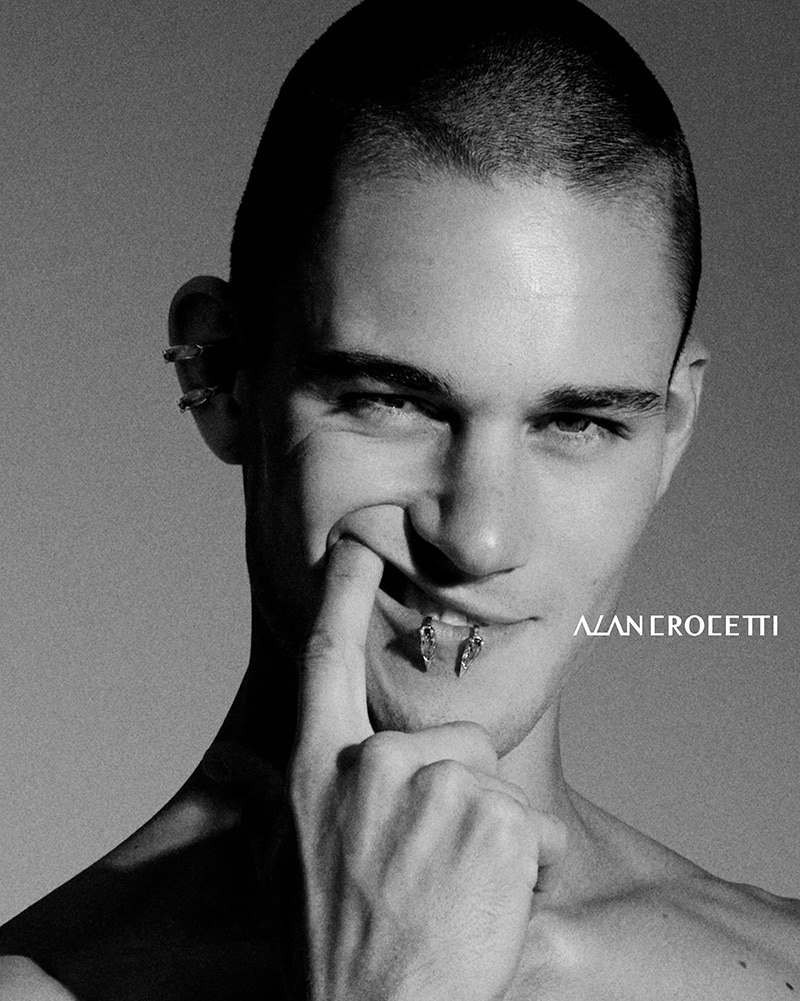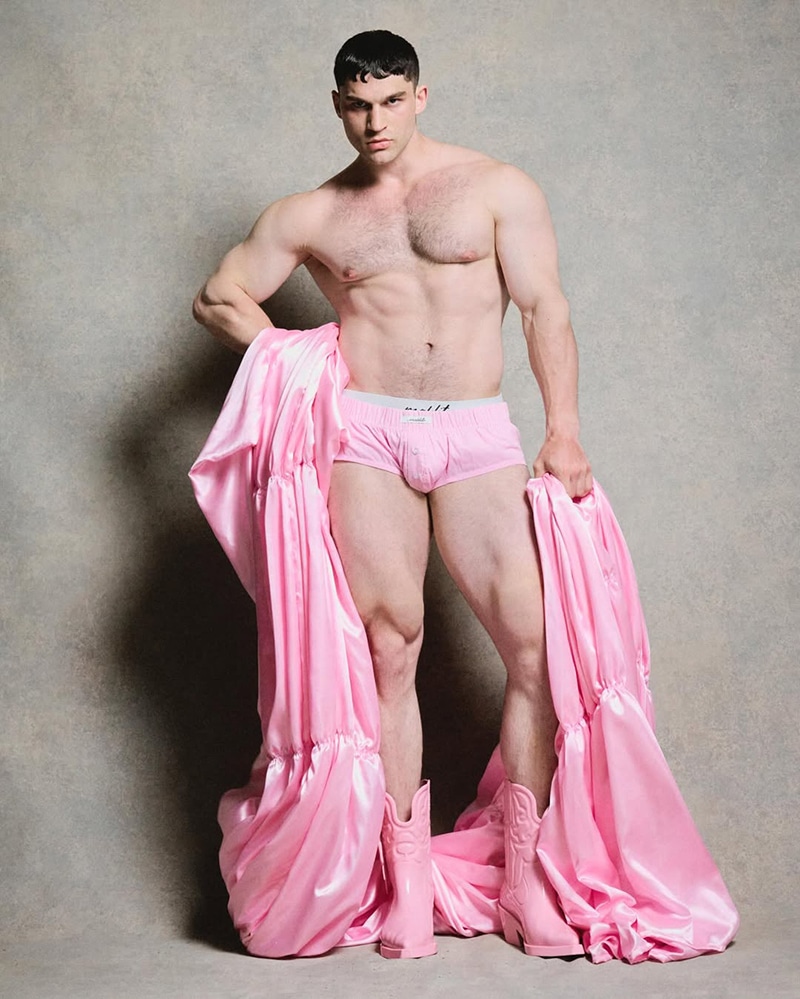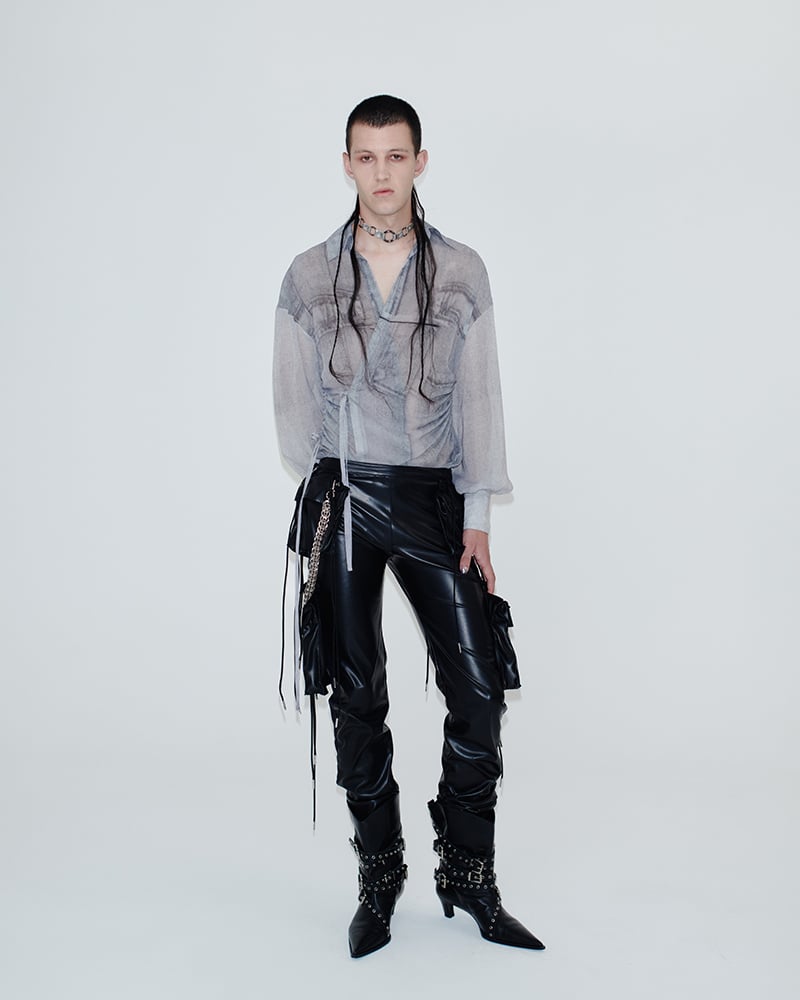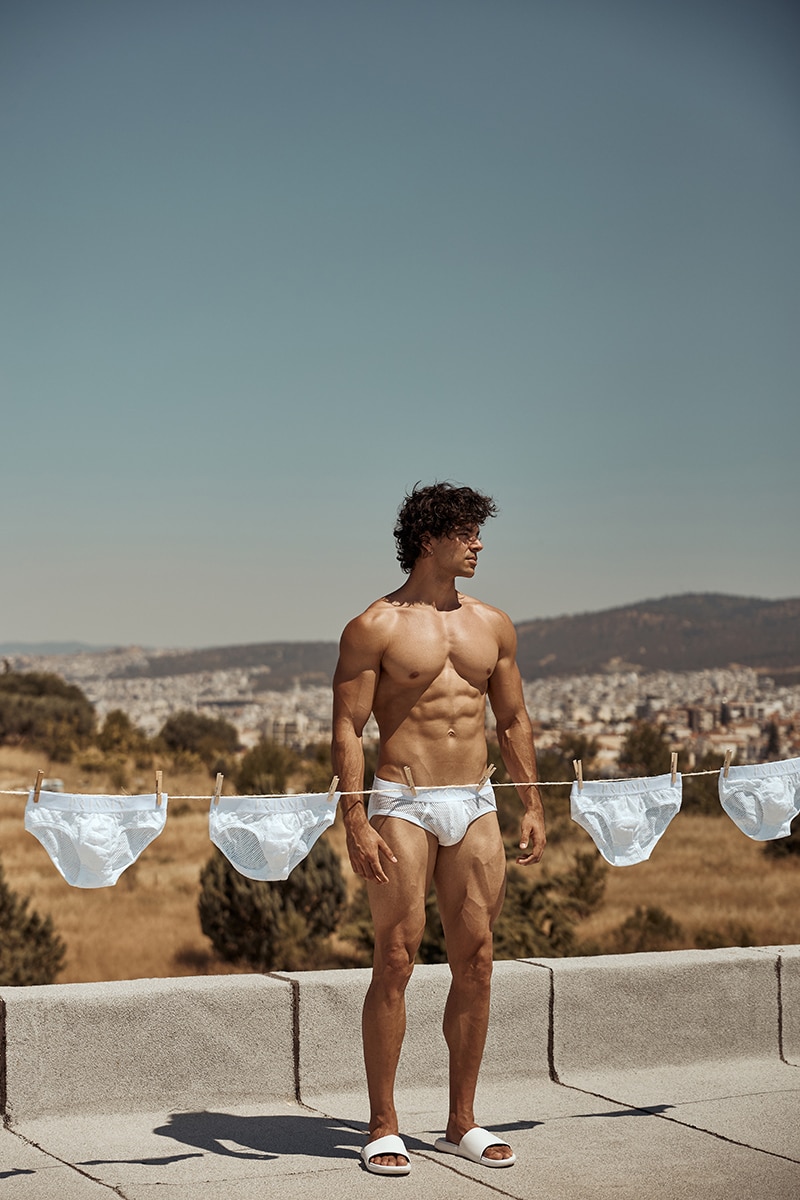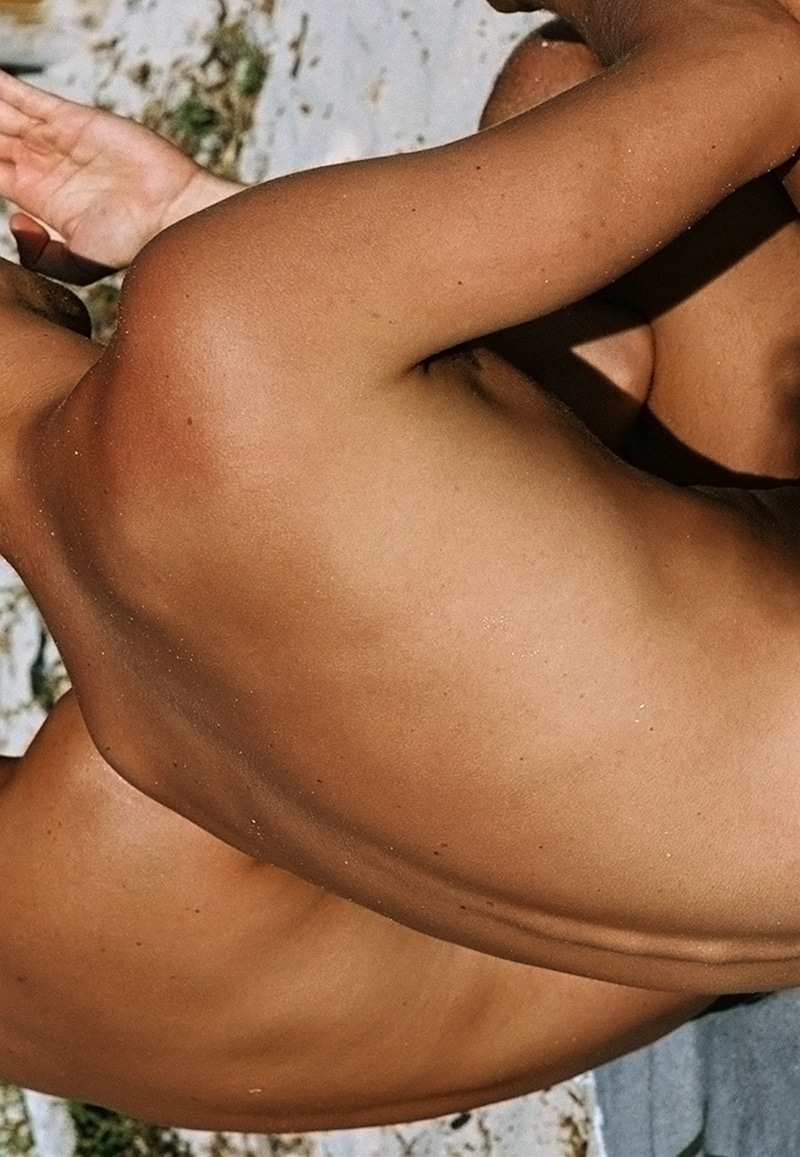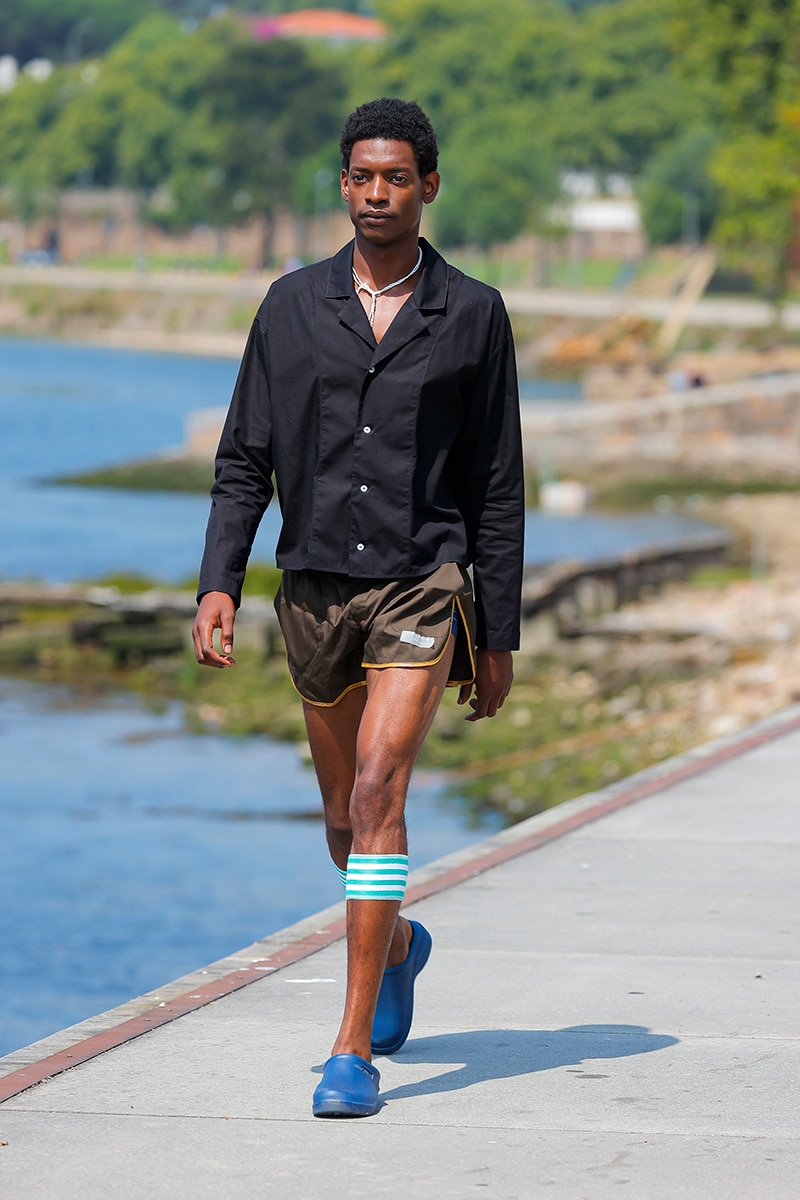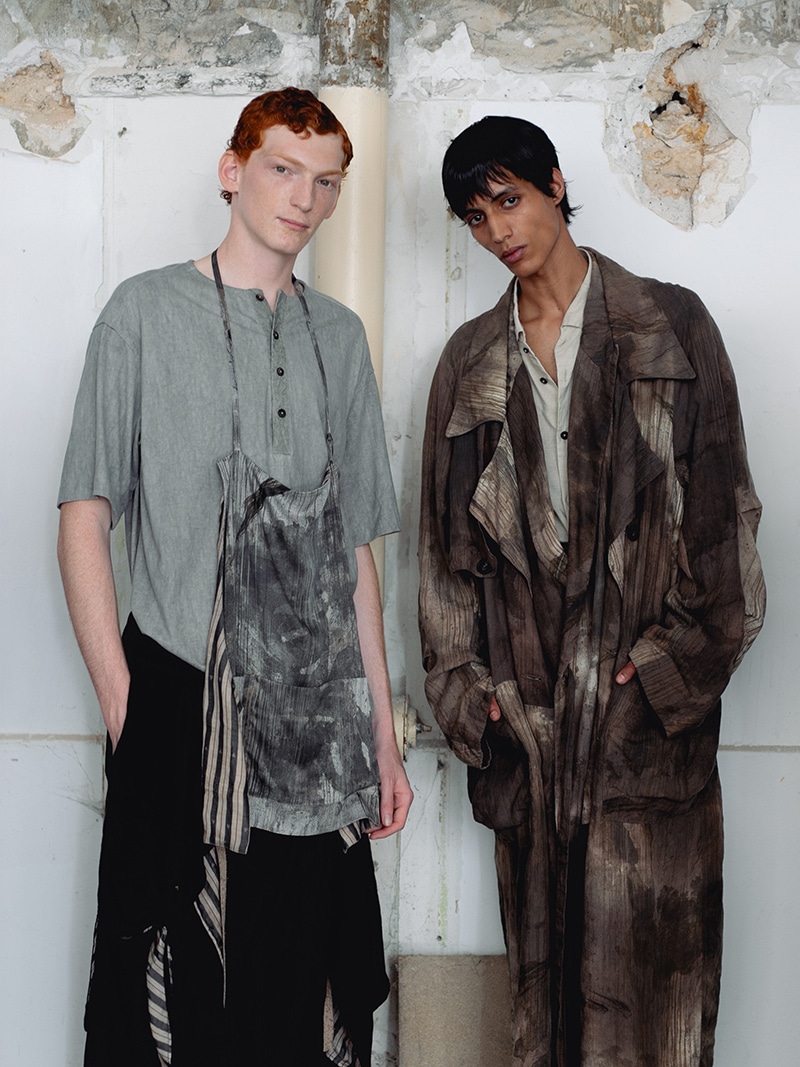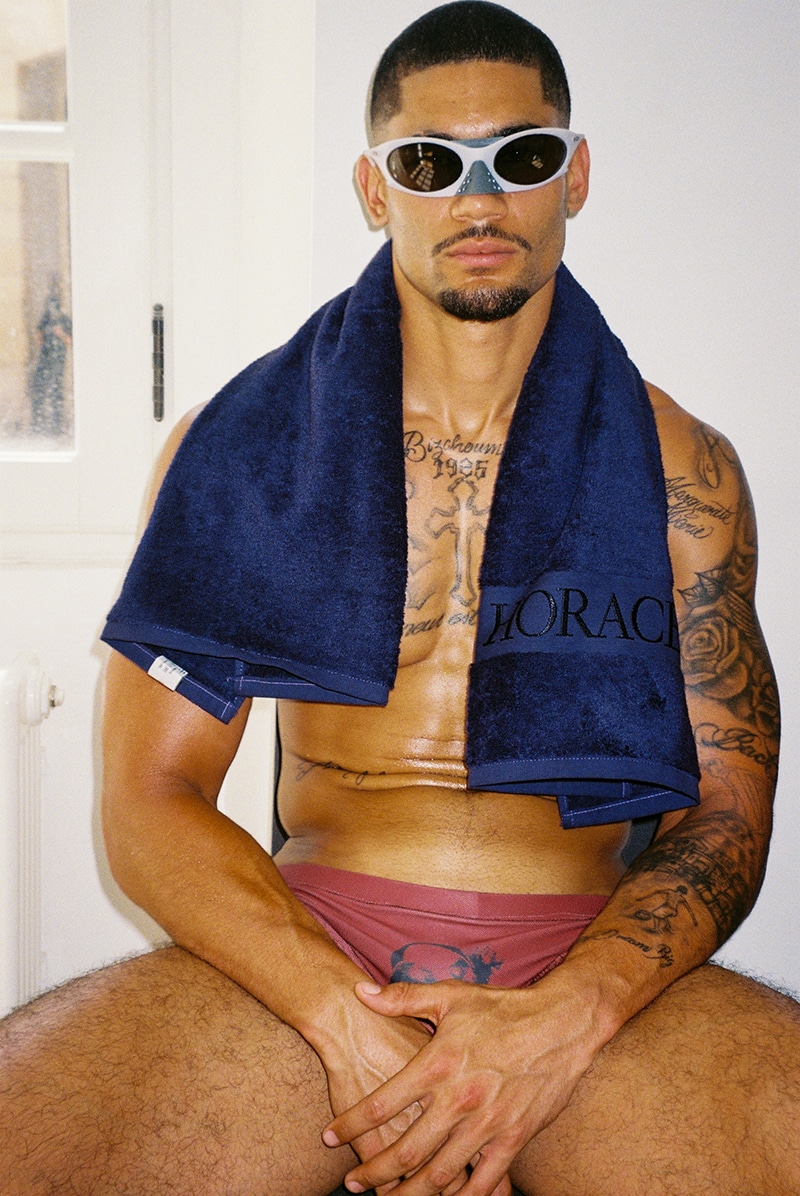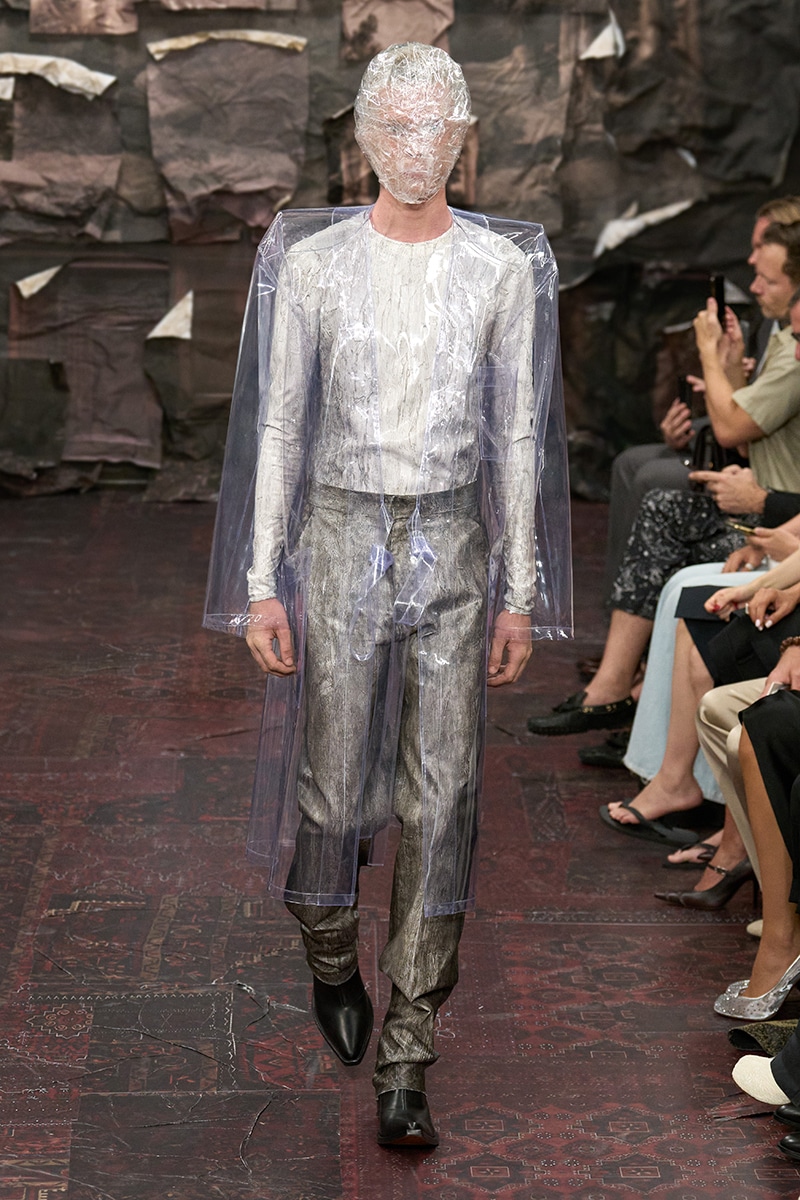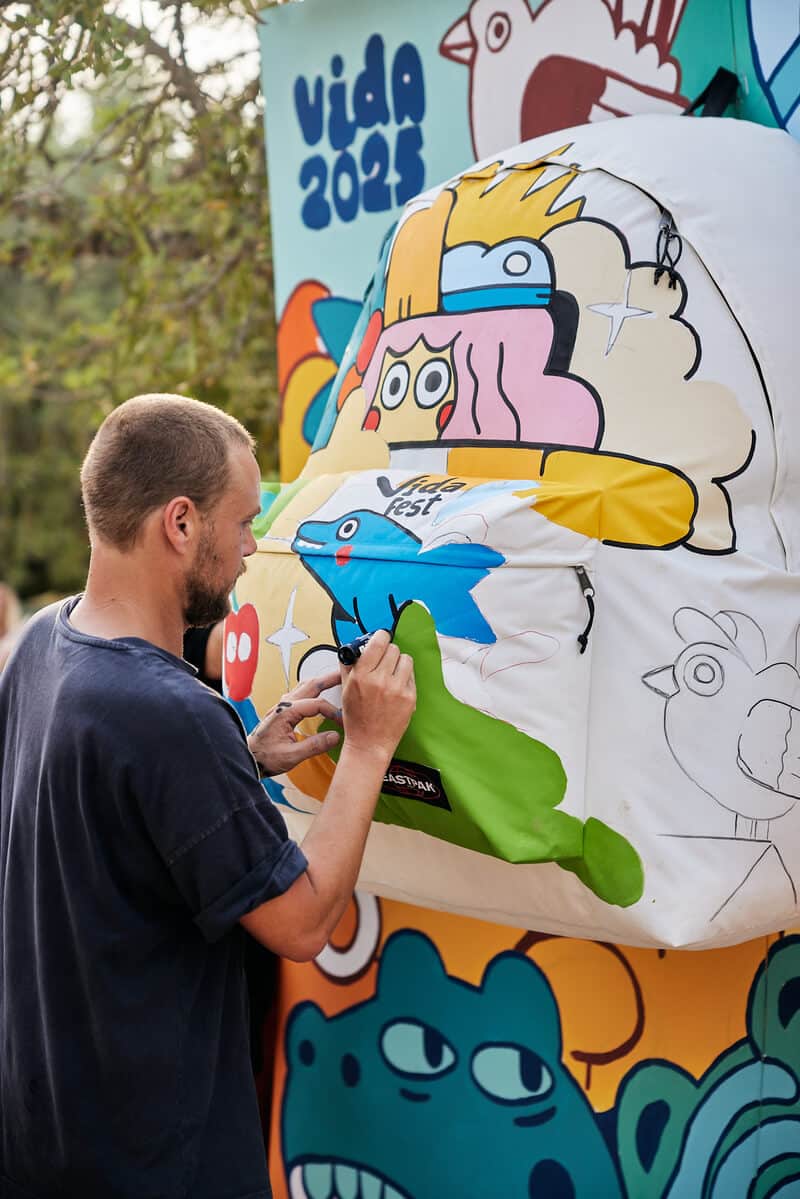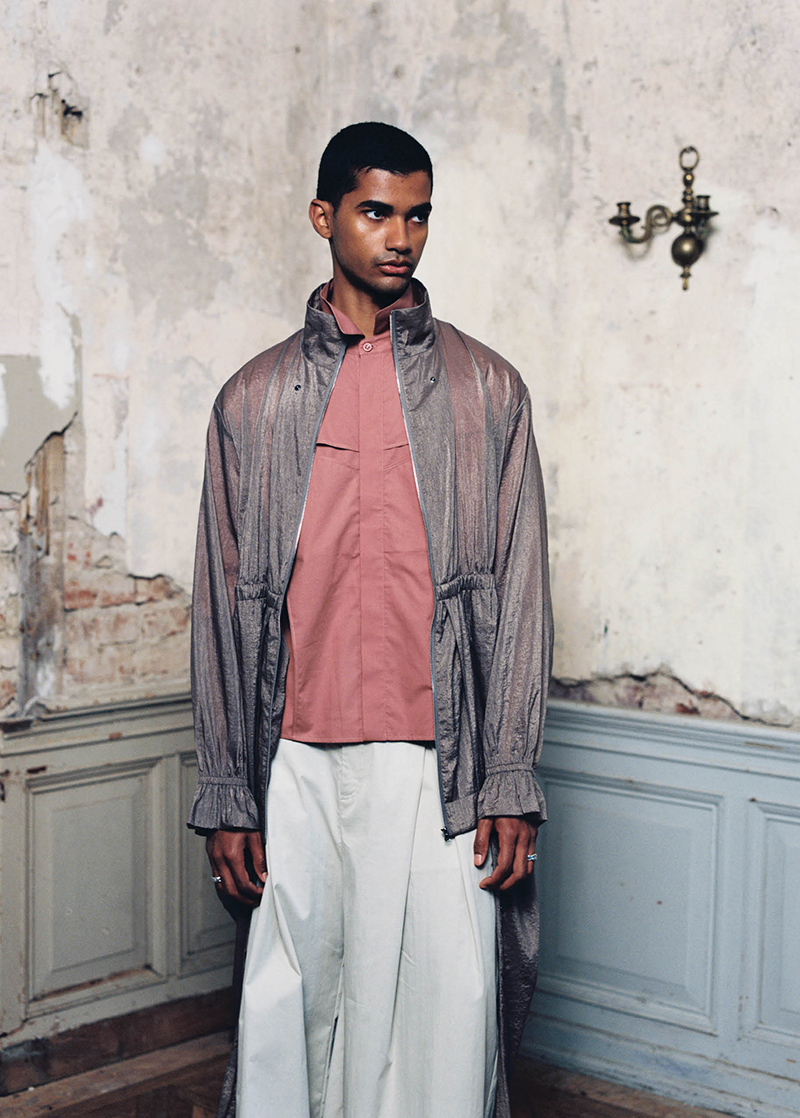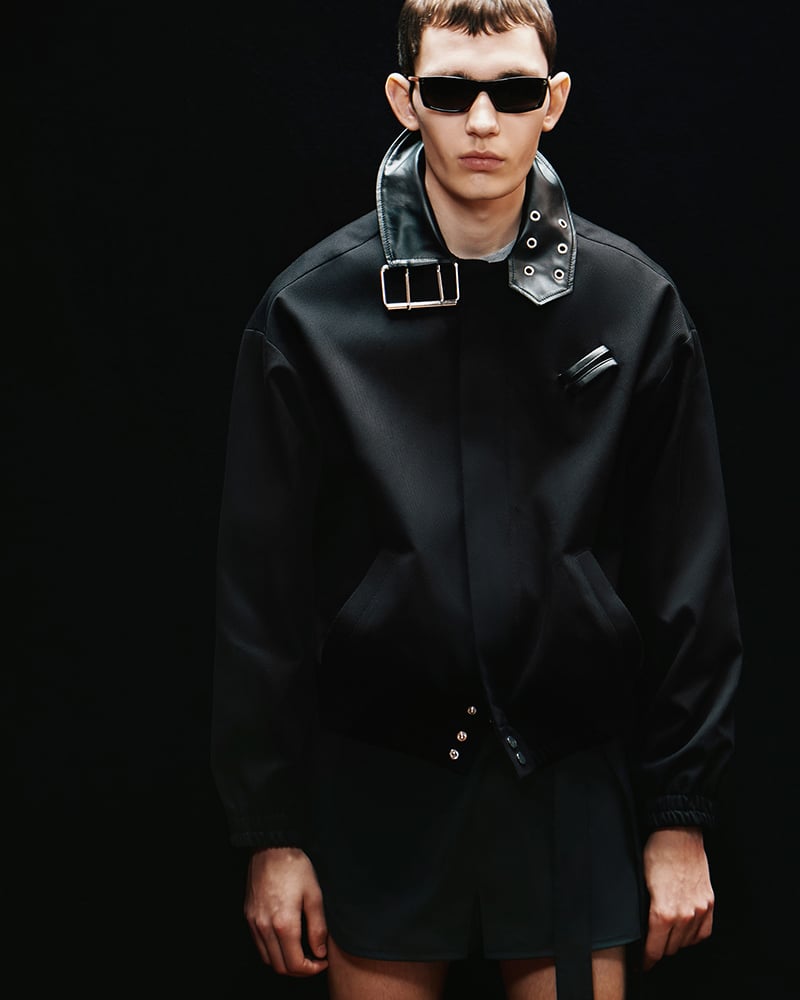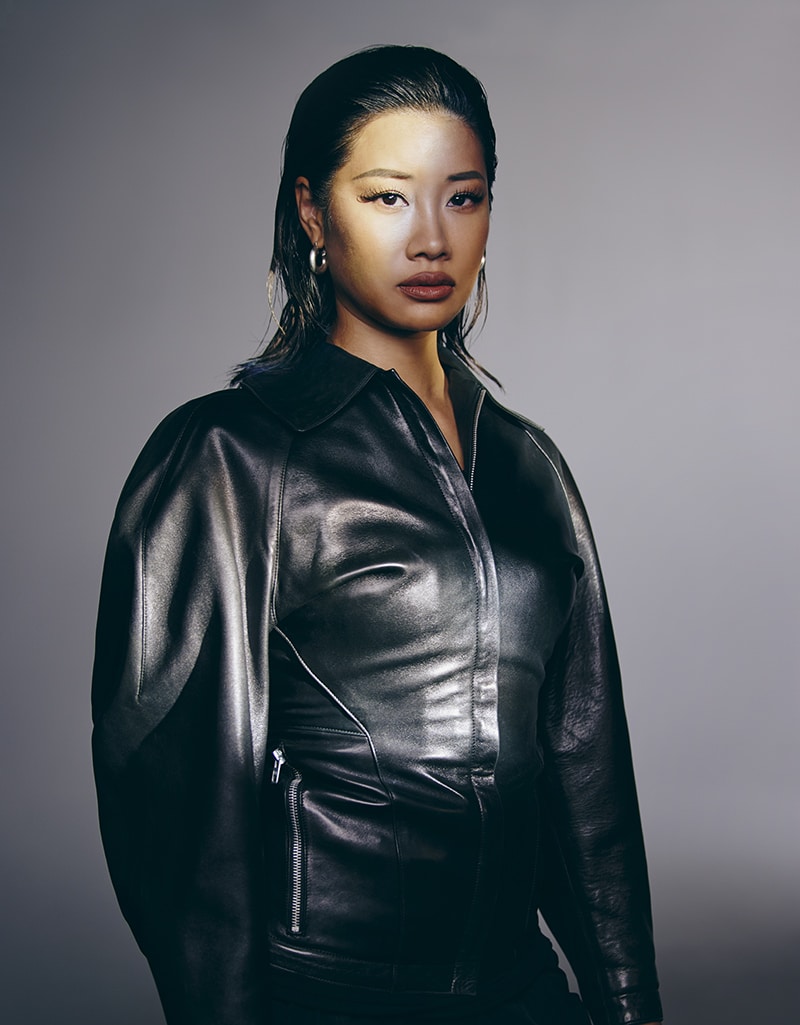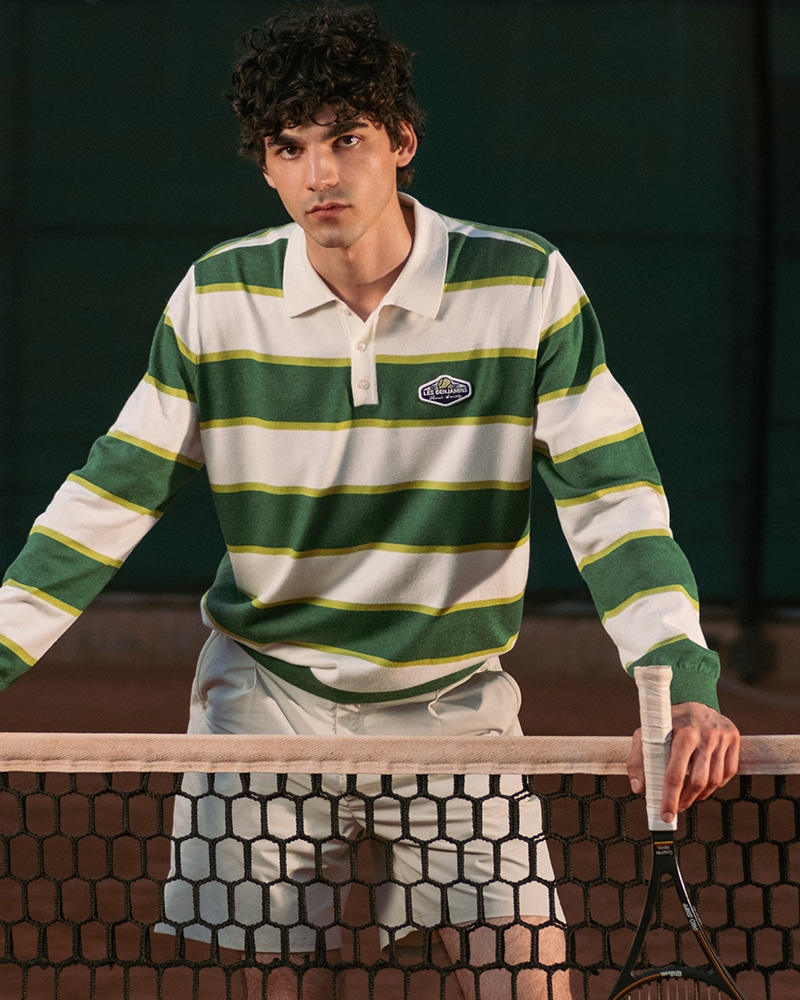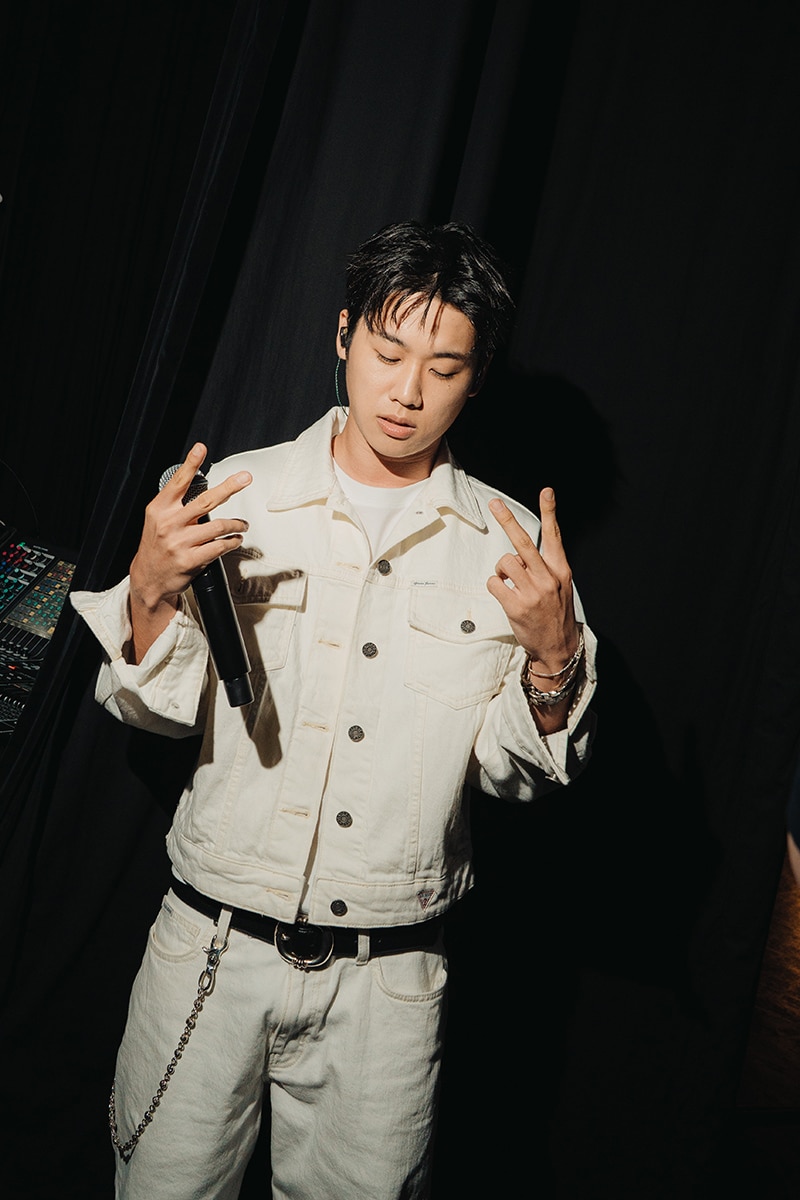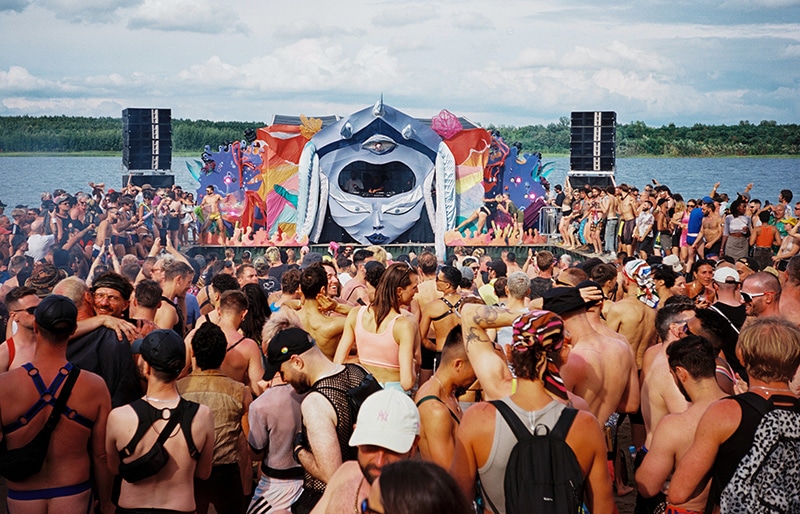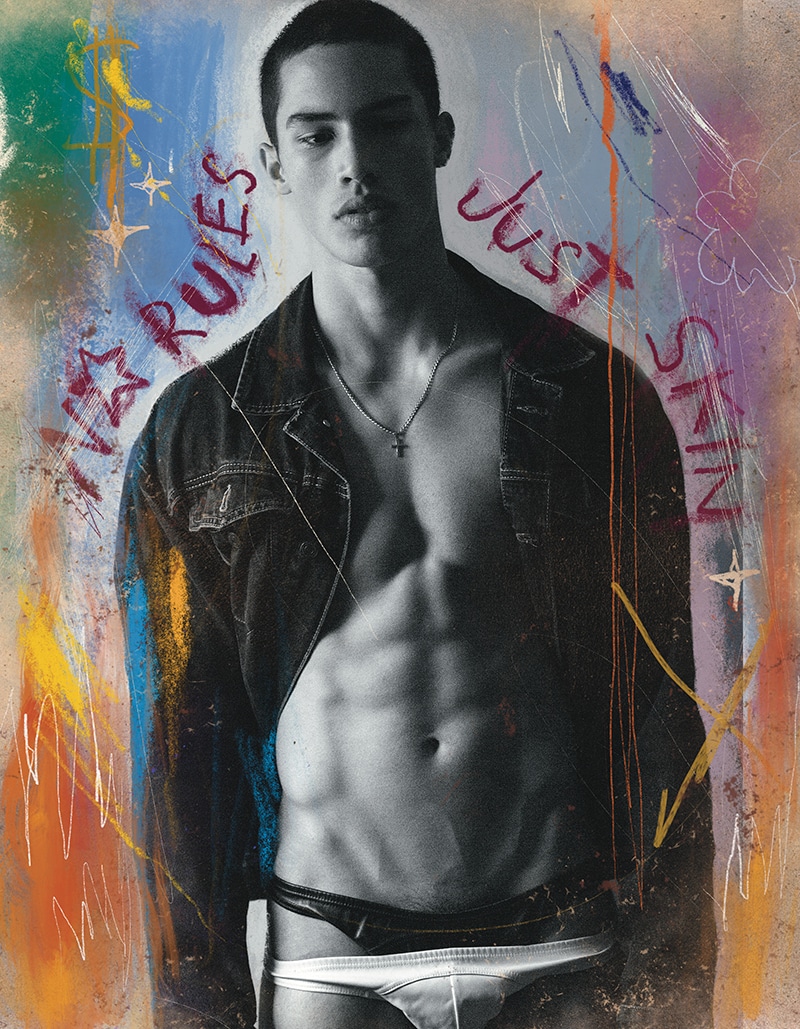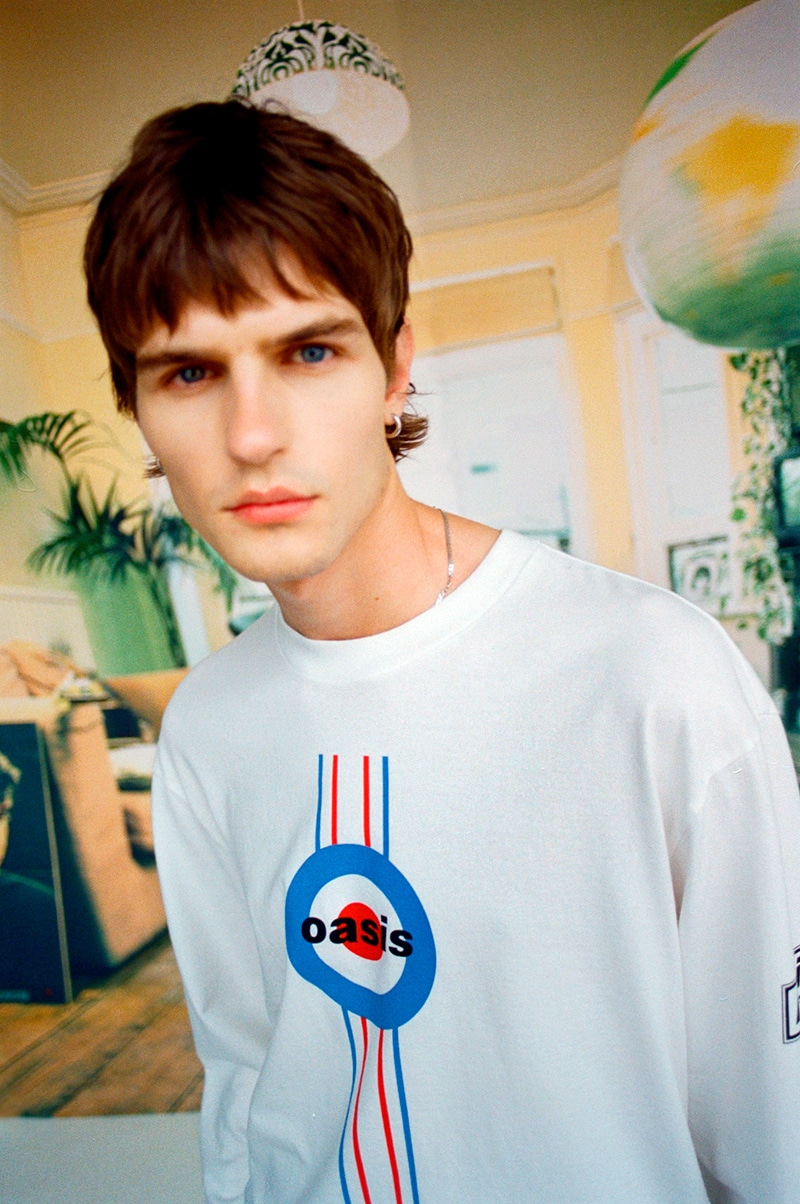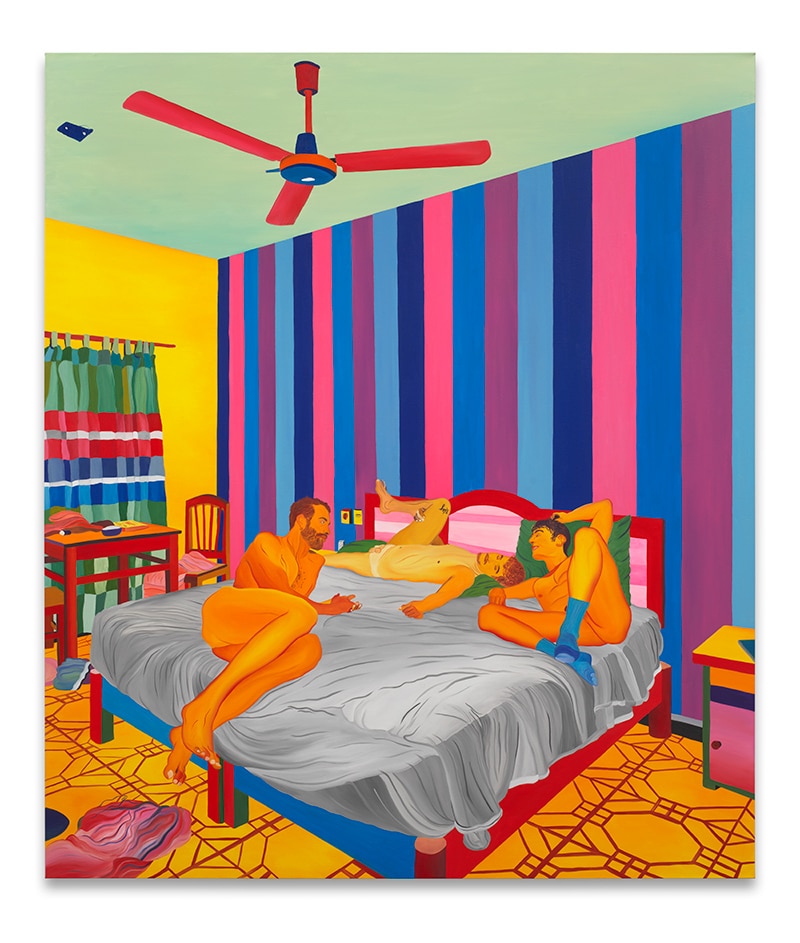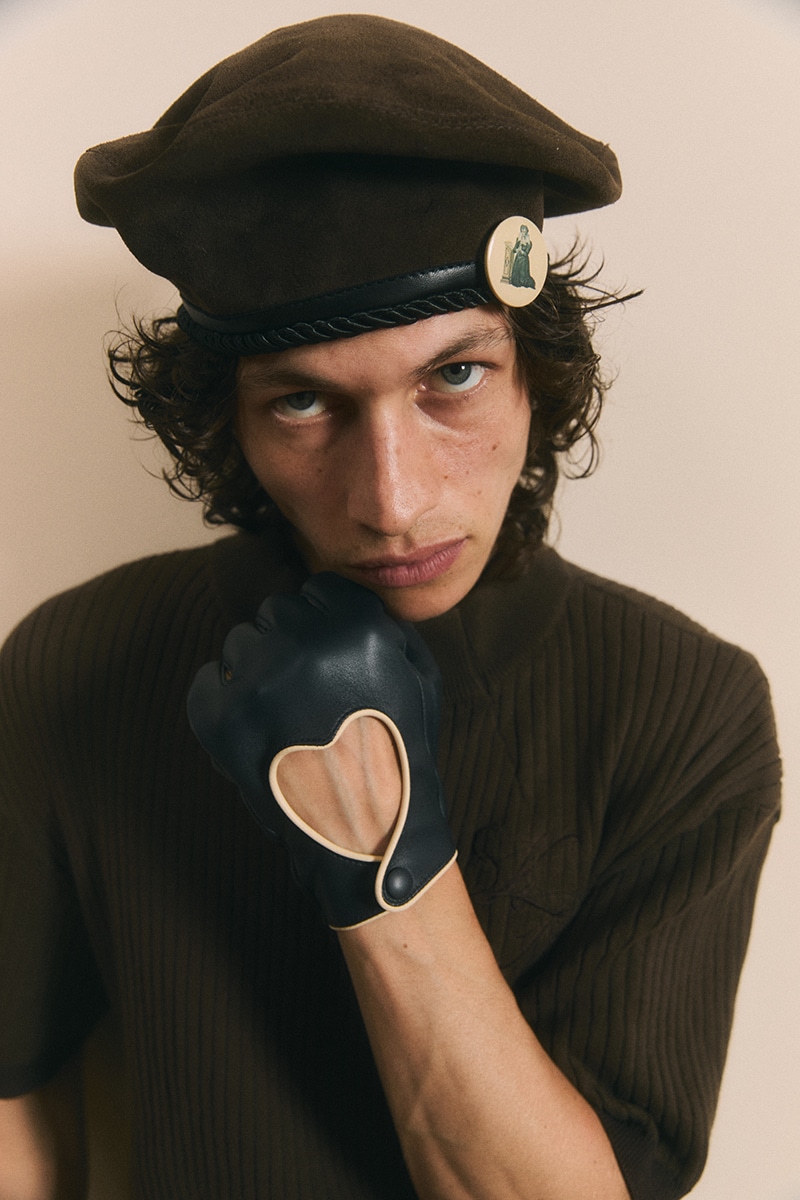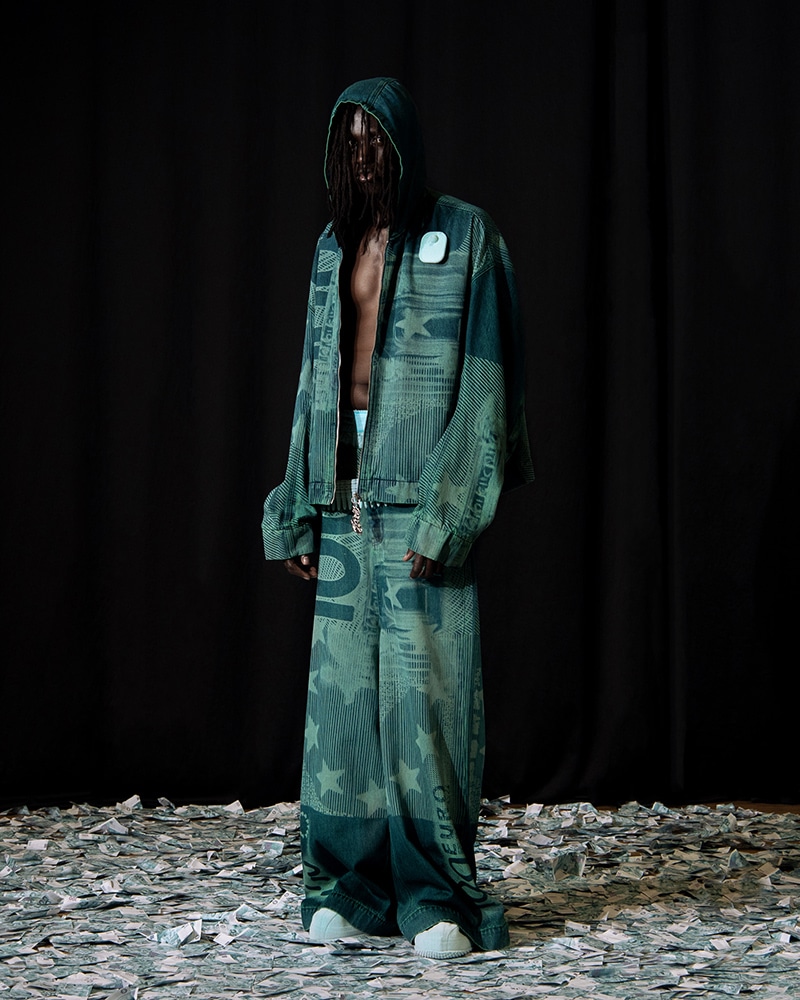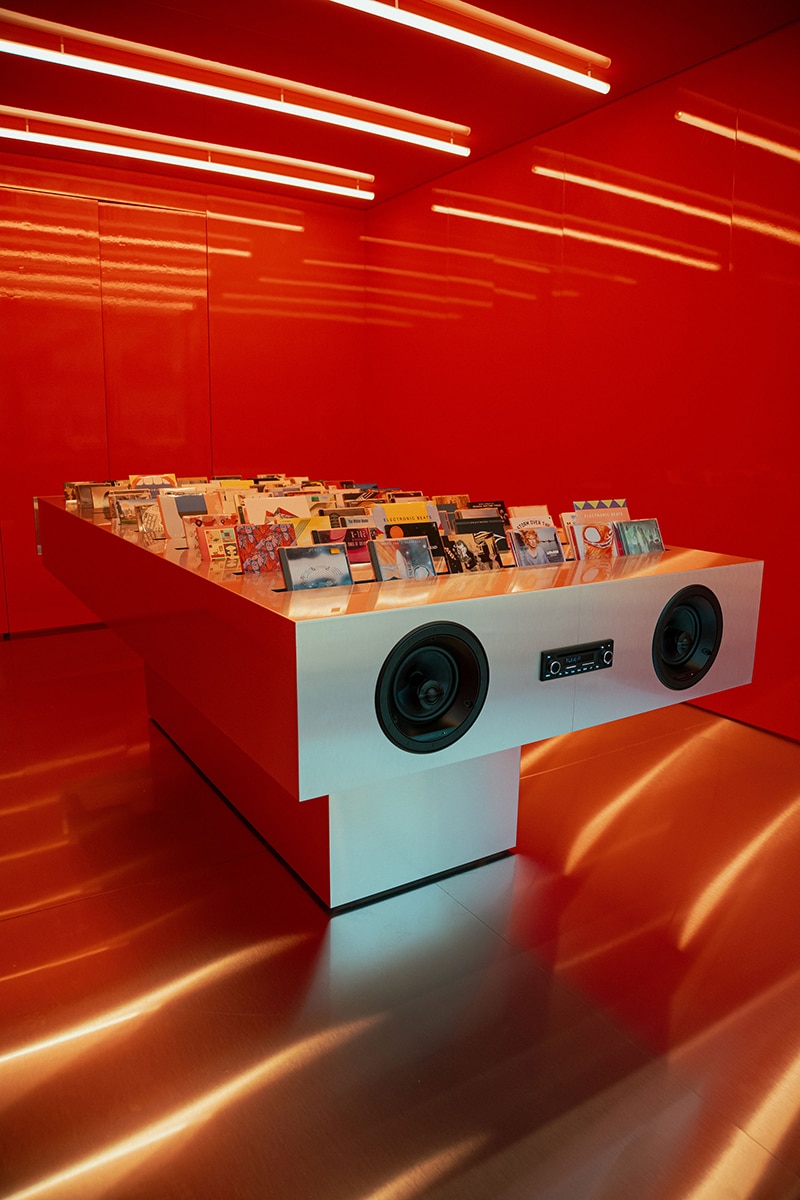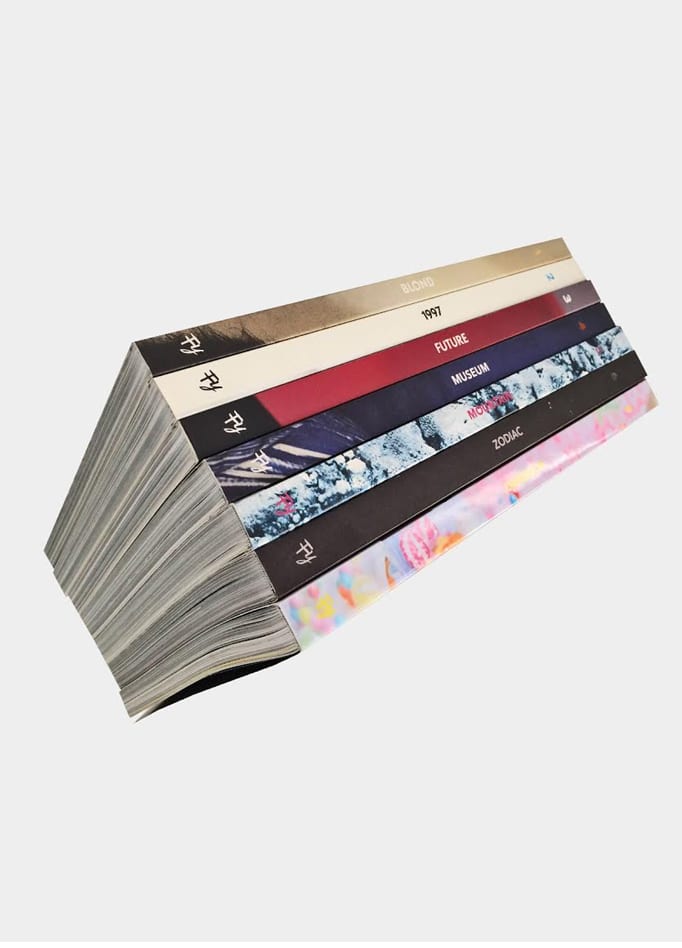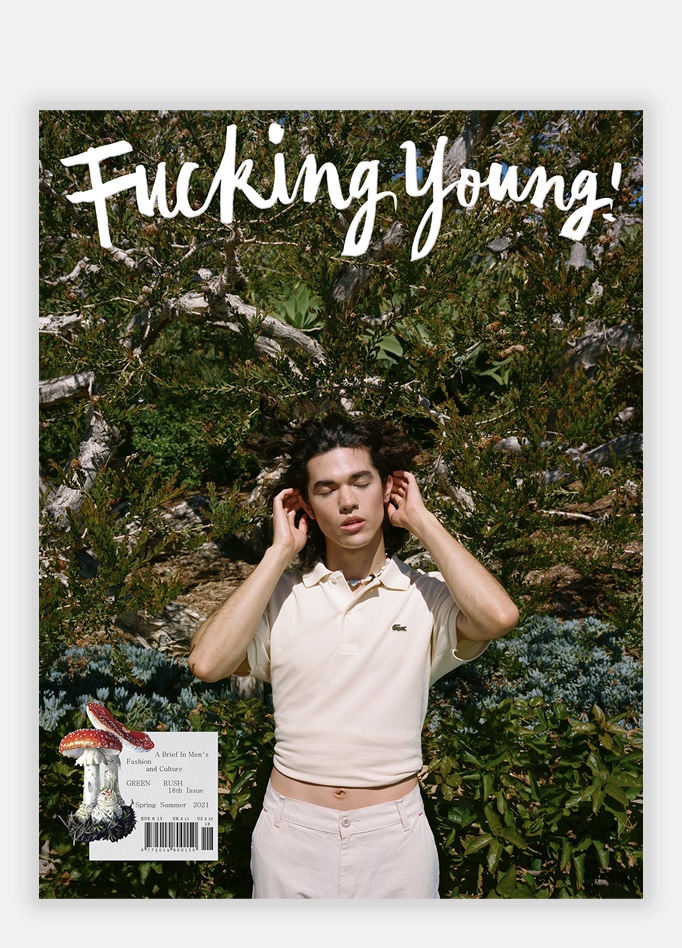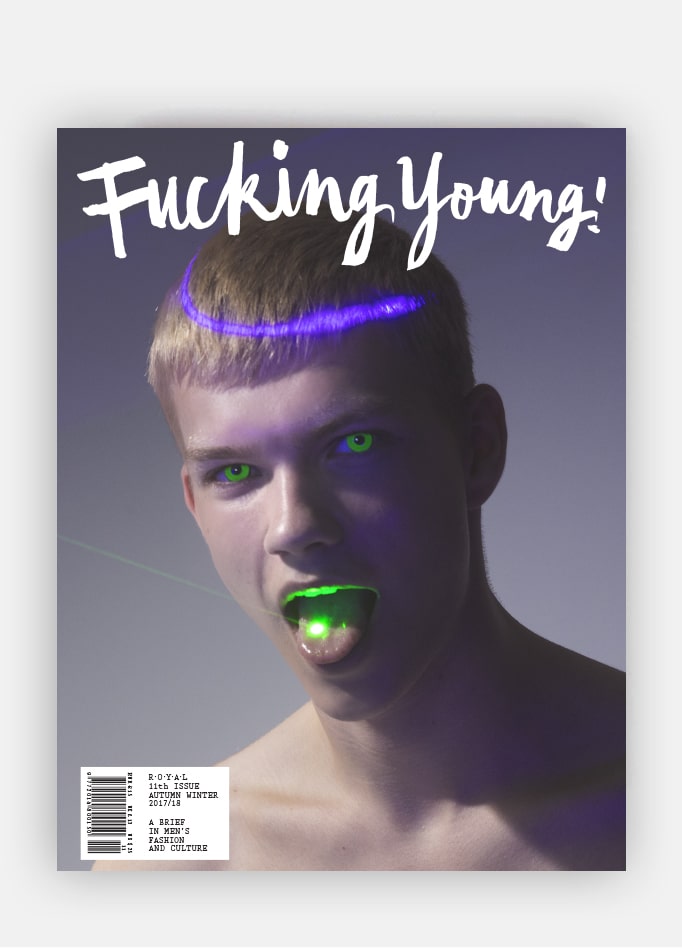
Louis Pisano doesn’t want to impress you; he wants to move you. “Growing up in a conservative household, I wasn’t always allowed to express myself to the world the way I wanted,” he wistfully says. He then sighs, momentarily abashed. “The image in my head that I had of my persona and how I wanted to be seen did not match the way I was forced to present myself,” he explains. There’s nothing like a little sheer escapism right now, and here, serving it up in the bucket is the raw craze hailing from Louis, accompanied by undeniably laudable hopes. Born in the States and then cruising to Italy, Pisano spent his youth exploring creativity and fashion, carving a lane of self-discovery (a few years were spent living in Milan doing just that), before landing a job in public relations straight after his arrival in Europe. “I wanted to live my La Dolce Vita fantasy,” quips Pisano. “I became sort of a club kid and met profiles who worked in fashion. As such, I started getting invited to events left and right, and from being in the right places I caught the eye of a powerful PR woman who also ran the trendiest club night in Milan called Punks Wear Prada, where she appointed me as door selector and office runner during her fashion events. That was my first official job in fashion.” If you thought to swing by an easy lane to conquer the ranks of an industry often condemned as detrimental, think again. His experience seeped with pain and soreness. “The work environment in Italy was pure toxicity, but those years I worked in PR just focusing on the good were an experience,” he tells me, adding a positive nudge. Pisano is, he believes, at the beginning of a fearless era, conscious of his identity and of his thriving advocacy that pushes for a change in the system. Foremost is a description he uses with utter ease: “disruptor.” As we speak, he is attempting to smolder the distress and illustrate a deeper side of the narrative. Here of all places, his mind is threatened to halt a message that’s been kicking since an early phase of life. As I cement on to the following question, I sense the anguish of a young man who’s been victimized for so long, for no cause. “It was such an adrenaline rush sometimes.” Louis is right. Tasked to turn his dream into the then unfeasible reality, his penchant defeated the angst, becoming a mainstay. “Back home in the States I was quite sheltered,” he recalls. “My brief stint at college was the first time that I discovered, despite how well off your family might be and no matter how smart you were, that being black was considered inferior by societal standards.” When realizing that modernity needed a support system in order to reach full potential, Louis approached society with a plan. “I’m trying to focus attention to a cause, demanding for change in the industry when it comes to how people of color are treated.” Looking back on the decade, we really have seen it all. Racism, a world-punching pandemic, political disruptions, and a deficit in civilization. “The most daunting aspect of society since my foray into fashion would have to be fighting 100 times harder for visibility when I see some white people putting in less effort and being rewarded for mediocrity point blank,” he says. Meanwhile, we’ve witnessed terrifying crashes down the aisle of the industry, where all seemed to go wrong. “I want brands to stop treating diversity like it’s a project; it should be something always on the forefront something that comes naturally,” he says. Openly admitting his creative persona is “a mess,” it was by striving to achieve equality that Louis was able to scoop the cream off the top – bordering a blend of brainpower, imagination, and genuine wisdom. “I have early memories of being sent to bed without dinner for coloring on my nails with markers or being yelled at for playing dress-up with neighborhood girls,” he reminisces. “There was a lot of abuse in my childhood home that made me hate myself for being different. I survived though, I’m here, and I’m thriving.” It’s safe to say that living in a whitewashed society can result excruciating. Firstly, for the painful lack of belonging we sometimes encounter. Secondly, for the ferocity that permeates humanity when we’re urged to accept the eagerness to embrace change. Acknowledging the blunder is one thing, but nurturing change itself that comes from it is something different altogether. Elsewhere, as Pisano blogged for as long as he can remember, there are times where he feels somewhat “overwhelmed”, but he’s thankful that people are finally listening and feeling empowered to find their own voices. When it then came to spotting the burdens in fashion, Pisano whipped his hells off, musing, “Wouldn’t it be great if fashion was a reflection of society instead of society a reflection of fashion?” Pisano is quick to shrug it off when I ask, “How do you solve this collective problem with race and biases that’s weakening society as a whole?” “Admit it,” he says. His message leaks truthfulness all the way. “Society can push against the mainstream grain of whiteness and embrace an inclusive ethos by helping to elevate diverse voices to positions of power, encompassing people that will stand up for marginalized communities. We don’t have to keep voting for old white men, we don’t have to keep shopping at white-owned and all-white staffed companies, we have to really come together as a society to challenge the status quo. Never accept everything as it is, question everything is sort of my mantra.” Now he’s leading the way for young activists above and beyond the fixtures of social media, his unyielding thirst powers every repression. “The current racial crisis has empowered me more than ever to keep speaking out until people get it, meaning we have to break the system. It’s inspired me to take more hands-on action. I have no words to describe how strongly I feel about this racist crisis; every atom in my body is racing with excitement for the possibility of living in a new world where we are all equal. Let’s revisit this in a year and hope we’ll be talking about a slew of new black people in positions of power. Until then, you can catch me online and, in these streets, calling for change.” As progressive times require progressive plots of action, it’s not difficult to believe he won’t be resting on his laurels anytime soon.
For Louis, acting on instinct surely paid off. “I know who I am: I’m a queer black man,” he boldly exclaims. “For the first two decades in my life, this was not an identity I was comfortable with because I was trying so hard to assimilate to a society that prioritized white heterosexual masculinity, but I’m here now.”
The rest of the world isn’t able to kill it at Pisano’s pace, that’s all.

First of all, I’d like to thank you for tuning in. Could you briefly introduce yourself to us?
I hate when people ask me what I do, as I just sort of shrug and say everything. I’m Louis, I’m an American living in Europe, I’m a writer, social media person (I hate calling myself an influencer, it’s so narcissistic), activist, and disrupter. I’m a person who doesn’t know when to keep my mouth closed, so I’m cool with whatever. In all seriousness, though, I’m a writer and that’s my focal passion. In school, I always talked too much to the point where my teachers would put my desk in the corner faced to the wall, so I wouldn’t disturb the class. Therefore, I wrote down all the things that went through my head instead such as the stories and ideas that I lived through as a kid. Back to present times though, I bounce back and forth between Milan and Paris. I travel to Milan for work-related purposes, whilst I head to Paris for inspiration. I used to think Paris was also a refuge from the racism I face in Milan, but as of now, it’s gotten way worse in Paris.
Your media platform holds a sharp, powerful sense of awareness of the fashion system from many levels. What brought you to delve into such field?
I’ve always had a deep fascination with image and the tools people use to create personas and characters to tell a story about themselves. Growing up in a conservative household, I wasn’t always allowed to express myself to the world the way I wanted. The image in my head that I had of myself and how I wanted to be seen did not match the way I was forced to present myself. As dictated by my white adoptive father and what he believed was the image of an acceptable young black man based on stereotypes (people who wore sagged pants were thugs and the like), I began to understand the power fashion had in determining who you were perceived to be. This was the jumping-off point for my interest in exploring the world of fashion up close.

Diving into your career and path, was it how you expected it to be?
I wouldn’t say I had a clear career plan when I first arrived in Europe aged 19. I was more interested in just being in proximity to fashion and the easiest way I found was through the party scene in Milan. At the time, the most famous club was a place called Plastic, and figures such as Andy Warhol and Madonna had frequented it. I heard that anyone who was ‘anyone’ in the fashion system went there every Saturday night, so that’s what I did, I dressed up and went for a boogie. I wanted to live my ‘La Dolce Vita’ fantasy. I became sort of a club kid there and met people who worked in fashion. That occurrence started getting me invited to events here and there, and from being in the right places I caught the eye of a powerful PR woman who also ran the trendiest club night in Milan called Punks Wear Prada, where she installed me as door selector and working in her office on her fashion events. That was my first official job in fashion. Prior to that, I had no experience other than going to parties and dancing on DJ booths in dresses, but there I was helping in events planning for some of the biggest fashion houses in Italy. Let me tell you, it was beyond what I had expected it be. Italy at its best is decadent, like Italians really know how to turn up in style, that’s part of what keeps me attached to this place despite all the bad. The work environment was pure toxicity, but those years I worked in PR just focusing on the good were an experience. For instance, I’ve worked on huge parties for Givenchy with Nicki Minaj performing, film premieres at the Venice Film Festival, helped throw a party at Cannes with Snoop Dog: it was insane and I felt like this was the space that I belonged, the job that I was always supposed to have. It was such an adrenaline rush sometimes.
As a black man living in a white world, the road must be rough, considering Westernised beliefs and behaviors towards minorities. Could you describe your experience with biases, oppression and social mishaps?
Back home in the States, I was quite sheltered. I grew up comfortable and in mostly white circles and I never remember feeling disadvantaged being black, because I was privileged enough to have people around who were black for the most part. When I left home, however, was when I really had my eyes opened. My brief stint at college was the first time that I discovered, despite how well off your family might be, no matter how smart you were or talented, or how “white” you sounded, or how expensive your clothes were, that being black was considered inferior by societal standards. I went to a university in the South; I was your run of the mill preppy motherfucker: Ralph Lauren, khaki shorts, ribbon belt, boat shoes bitch. I felt like the fraternity/sorority world was my assigned place in the collegiate hierarchy. Like I was a registered Republican, blimey, I had so much internalized self-hatred at that point on my life. I really did consider myself white. That idea was brought to a screeching halt when I participated in rush week hoping a fraternity would choose me to be a pledge. Bid night came and went. I wasn’t chosen. I didn’t go to class that week I was so upset. Why had I been refused entry to join the elite? A little bit of background: fraternities and sororities in the South are notoriously racist and this I knew, but in my head, I told myself that if I wasn’t like the black people they didn’t like, they would have accepted me. They did not. My girlfriends at the time really had a sit down with me that week about the reality of the situation. It didn’t matter how funny I was, how many girls I could bring to the parties, how nice my clothes were, that I was willing to pay the price of admission in the form of exorbitant dues. I was a black person and not only that flamboyantly gay. God, I was so affected by that at the time like I felt like my life was over. If only I could tell Budweiser beer-drinking Louis in his topsiders that that was nothing compared to what other black people less fortunate than me had to go through, I think I would have been a little more prepared for what I would face in Europe.
What’s the most daunting aspect of society you’ve had to deal with since your foray in fashion?
The most daunting aspect of society since my foray into fashion would have to be fighting 100 times harder for visibility when I see some white people putting in less effort and being rewarded for mediocrity point-blank. Also, no matter what I do here in Europe and in Italy and especially as a black person, I am and will always be seen as an outsider. That’s why when I do things, I make sure that it’s loud and it’s flashy so that while I’ve got the attention on me, I can showcase my talent. My parents always commented on my incessant need for attention which I completely own, but sometimes you have to yell to be heard above the crowd, and now that’s what I’m doing instead of trying to focus attention on me as a person. I’m trying to focus attention to a cause, a demand for change in the industry when it comes to how people of color are treated.

What are the meaningful steps that you’d like to see happening to factualize change?
I have no patience first of all, so I honestly hate all these long plans people make to try and change something. I like to see things be put in motion immediately; maybe that’s my problem, but ok. I want brands to stop treating diversity like it’s a project, it should be something always on the forefront something that comes naturally. For that to happen there needs to be a huge overhaul of the power-players currently in fashion. Forward-thinking people with open minds need to be the decision-makers, the opinion leaders, the examples from which everyone follows, and not people who jump on the diversity and inclusion train to avoid backlash. Rather, people who have these values deeply ingrained within them. From there, we can really start to make a change. Out with only thin white and euro-centric and in with everyone.
How would you describe your creative persona?
My creative persona is a mess. I always want to do everything, be involved in every step of something. I’m not a control freak, I just like knowing when I see a final result that I really helped create whatever it is. Someday, I would like to have my own agency because I have so many ideas that I would love to see come to fruition. That was the hardest part about working for someone, especially when it came to event planning was having ideas shot down and mostly due to someone’s ego.

How about your identity?
I know who I am: I’m a queer black man. For the first two decades in my life, this was not an identity I was comfortable with because I was trying so hard to assimilate to a society that prioritized white heterosexual masculinity, but I’m here now. The internet definitely played a huge role in learning to love me, that there were black boys like me. I have early memories of being sent to bed without dinner for coloring on my nails with markers or being yelled at for playing dress-up with neighborhood girls. Moreover, I remember my father calling me a sissy for throwing underhand during forced games of catch and telling me he would break my wrist if I kept throwing like a girl. There was a lot of abuse in my childhood home that made me hate myself for being different. I survived though, I’m here, I’m thriving.
Could you say social media have given you the voice you were always after?
Social media has definitely given me the voice I was after. I always felt silenced as a child: I believed my thoughts, feelings, and opinions were invalid. I guess now is making up for all of that. I feel seen. I feel like my voice is being heard. Italy is a country where speaking up and speaking out is not encouraged. There’s a lot of secrecy here, things being covered up by powerful people in every industry. I want to encourage people to use their voices if they want to start seeing change. The first step to solving a problem is admitting it exists. I get messages all day from people, kids, telling me that I helped them find the confidence to confront the people around them about where they stand on issues, whether it be racism, sexism, femme shaming, and that from my Instagram stories they learned something and went and started researching things and teaching others in their communities and taking action to create positive change. It’s overwhelming sometimes, but I’m thankful that people are listening and feeling empowered to find their own voices.
What are the most impactful steps you’ve witnessed manifesting since you took the helm of your Instagram, advocating for equal rights?
One of the most impactful steps I’ve seen taken as a result of my advocating for equality online happened last year. Never in all of ten years in Milan has a brand ever reached out to the black creative community. There was an unfortunate incident at a Tommy Hilfiger event for Lewis Hamilton during fashion week, involving black influencers where something that I perceived to be racist occurred. It was another incident in a list of things I had noticed the brand was doing wrong when it came to diversity and inclusion in the local community. The previous being no black influencers were included in the first Tommy x Zendaya collection launch. I posted about it because I was really upset, I was tired of these people making us feel like we were inferior. Within an hour, I had the PR from the hired agency of the event calling me asking me to delete the stories, which I did not do because nobody is going to tell me what to do when it comes to how I speak about racism in the BAME community. It followed by the PR from the parent company of Tommy Hilfiger, apologizing for what had happened and inviting us to come in to discuss. We met with the Marketing and Communications Director and we laid it all out. Brands in Milan exclude black creatives. I have to say I was shocked by how genuinely concerned she was that they were not doing their best to include the local black creative community. Fast forward to the second Tommy x Zendaya launch, for the first time ever in Milan I saw all the black content creators and a Muslim hijab fashion influencer dressed in the collection attending the event, alongside the usual white influencers. Like I literally get chills thinking about it. I would say since that things are progressing albeit slowly. I have something huge in the works, it’s going to be the first time it’s being done in the Italian fashion system. It’s really going to get the creatives of color the exposure they deserve.

What does inclusion mean to you?
Inclusion to me means everyone plain and simple. That everyone is seen, that everyone is represented. Skin color, ethnicity, sexuality, body shape, and representation are all extremely important. It’s very formative, especially for young kids, knowing that they can be free to be whoever they are and not feel like anything about them is a detriment. Like every space should be filled with all kinds of people so that we can start to break harmful societal ideals. I like to dream big. Like for fucks sake, pardon the youthspeak, nobody should ever have to feel like they’re not good enough. The fashion industry has a huge influence on how we perceive ourselves in relation to the standards it imposes. Wouldn’t it be great if fashion was a reflection of society instead of society a reflection of fashion?
It’s fascinating the way you’ve rationalized on Instagram, in relation to a post where you argue about Grazia Italia’s silent racism, featuring an all-white casting of talents over the last year. I couldn’t agree more. How can society finally push against the mainstream grain of whiteness, and learn to embrace an inclusive ethos?
Society can push against the mainstream grain of whiteness and embrace an inclusive ethos by helping to elevate diverse voices to positions of power, encompassing people that will stand up for marginalized communities. We don’t have to keep voting for old white men, we don’t have to keep shopping at white-owned and all-white staffed companies, we have to really come together as a society to challenge the status quo. Never accept everything as it is, question everything is sort of my mantra.
Has the current racial crisis empowered you in a way?
The current racial crisis has empowered me more than ever to keep speaking out until people get it, meaning we have to break the system. It’s inspired me to take more hands-on action like if I have to physically go to these brands and agencies to present them diversity proposals I will. I have no words to describe how strongly I feel about this racist crisis; every atom in my body is racing with excitement for the possibility of living in a new world where we are all equal. Let’s revisit this in a year and hope we’ll be talking about a slew of new black people in positions of power. Until then you can catch me online and, in these streets, calling for change.

